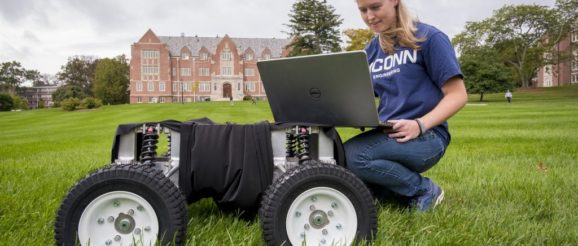New Program is Fertile Ground for Student’s Innovation

Most days, Emily Yale is moving between the Castleman Building and the School of Business Building on the Storrs campus, learning and testing concepts about entrepreneurship.
The University of Connecticut student is in the process of launching a startup, Land Maverick, and she is tapping the resources of the Schools of Engineering and Business.
“Entrepreneurship and building a company is a blend between business and engineering with a little luck, uncertainty, and chaos thrown in the mix,” said Yale, of Branford, Connecticut.
Her development, Land Maverick, is an autonomous robot with several sensors that test the soil and notify landscapers and golf course supervisors about water levels, potential disease, or problem areas.
Traditionally, Yale said, golf courses pursue a method of over-applying chemicals on their grass, to make sure that disease is never a problem, but this method lacks accuracy, and can cause devastating environmental effects.
“Right now, what golf courses do is over apply chemicals, to make sure that they will never have a disease present,” Yale said. “I actually have friends that live on golf courses and they’ll say things like ‘The superintendent turned my pond purple this year.’”
Yale has started testing her service with golf course owners across the state. Her subscription-based service is not only more environmentally friendly, but also economically friendly for clients, she said.
“Not only will this technology potentially cut their costs in half, but it will, more importantly, avoid the ineffective use of labor, freeing up personnel, and reducing overtime costs.”
Yale is one of the first students in the new Master’s of Engineering in Global Entrepreneurship program— a joint effort between UConn’s Schools of Engineering and Business, Trinity College, and the University of New Haven.
Originally, Yale conceived of the project during her time as an undergraduate at Fairfield University, as part of her senior design project.
“When we started that first robotic unit, we were focused on the agricultural sector, but we learned quickly that golf courses had a greater interest in this new technology,” Yale said. “I can design the coolest, most exciting device in the world, but if it has no customer base, it’s not going places.”
After joining UConn’s program, Yale worked with faculty on solidifying the market for her product. With 15,000 golf courses in the country, Yale found a target market that has major potential.
“The combination of taking classes in entrepreneurship and engineering, and getting the chance to work with some very seasoned advisers has been a great experience,” Yale said. “That combination is very unique to UConn, and I’m not sure a lot of schools across the state would be able to pull this kind of program off, because of the resources and network UConn has.”
Looking ahead, Yale said that she is excited to grow her business in the state of Connecticut. And, she is pleased that she decided to pivot into entrepreneurship.
“Looking back, there’s never been a regret. In the tech startup world, there’s no time for regretting anything,” Yale said. “You just have to keep moving.”
